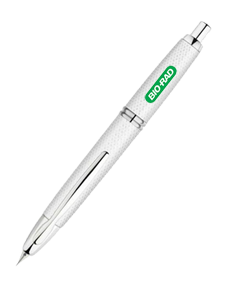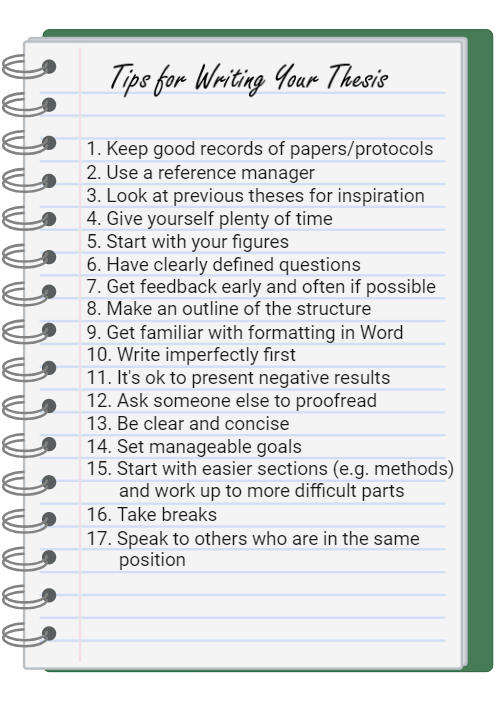
Popular topics

Tips for Writing Your Thesis

So, you’ve decided to start writing up your thesis. Now what? Writing a thesis can be a pretty daunting task and it’s easy to become overwhelmed by the mere thought of it. That’s why we’ve compiled our top tips to make your writing process as easy (or at least tolerable) as possible.
If you’ve already reached your top tier of stress levels and feel you don’t have time to read this blog, fear not! We’ve included a quick and easy version at the bottom.
Ready, Set…
The first step in writing your thesis doesn’t actually involve putting pen to paper (or, more likely, fingers to keyboard), but instead starts with preparation. Part of this preparation can be achieved by doing little things throughout your PhD, so if you’re in the first year of your project and thinking “this blog isn’t for me”, think again!
- Familiarize yourself with the specific guidelines for your thesis, as these may vary from university to university. Remember to check things like reference style and margin dimensions, so you don’t have to go back and restyle once you think you are finished. There are reference manager tools available, such as EndNote and Mendeley Reference Manager, which allow you to easily import your references and update them to the style you require. Typically, these tools also allow you to make notes and categorize the papers that you store in them, thus making it easier to find key papers when you begin to write up.
- Read theses from previous lab members to get a feel for the structure and format that you will be aiming for. This means that rather than going in blind and expecting to work it out as you go along (we’ve all been there) you get a strong idea about the level of detail expected. If you don’t have recent PhD students from your group to look at, many universities have an online repository of past theses in which you can search for a topic similar to your own to get an idea of how to present your thesis.
- Give yourself plenty of time. A thesis is no easy task! In an ideal scenario, you would be consistently writing up sections of your PhD as you go along. Unfortunately, this is not always feasible, especially with periods of heavy workloads or shifting projects, but where possible try to make progress little and often. Your future self will thank you!

Go!
Once your stage is set and it’s time to start writing, you may find yourself with no idea where to begin. Don’t panic, you’re not alone! The thought of writing an entire thesis is intimidating even to the bravest soul, therefore it’s best to break it down into smaller, more manageable sections.
A great place to start is with your figures. Deciding on which data should go together and in what order will help you form an idea of the story you want to tell. Always remember to have the question you want to answer clearly defined in your mind when you design your figures. Once you’ve planned out your figure flow, try to get feedback from your supervisor at this point. Some supervisors are more difficult to pin down than others but getting feedback early and often allows you to adjust your structure before investing too much time and energy into it.
Decided on which data will make the cut? Great, you can start to plan the structure of your thesis. At this point, it’s a good idea to get familiar with formatting in Word, or your preferred document writer. Things like formatting your figure and table titles and section headers so that they will automatically populate your table of contents page with the relevant page number will make things much easier for you in the future. Make an outline of your chapter titles, split them into smaller subsections, and fill in the content bit by bit. Again, once you have made an outline of the structure of your thesis, this is an ideal place to get your supervisor to check they are happy with it!

An Imperfectly Good Start
One common problem that can really slow down the progress of your thesis is the need for immediate perfection. Remember you are starting with a first draft, don’t get stuck trying to make it perfect at this stage. Rather than staring at a blank page, ditch perfectionism and write it imperfectly first to get your ideas on paper and to get into the flow of writing. Your work can be refined at a later date.
It's also important to realize that the data you include doesn’t need to be perfect either. Your thesis is not the same as a research paper. It’s ok to present negative results, as long as you have clearly defined reasons for trying the experiment. It’s also not necessary to have a fully finished story. Science works in a way where finding answers to questions often gives rise to more questions. It is unlikely that you will be able to close off every branch that stems from your research, which is acceptable, but be prepared to describe potential future experiments that you would perform to address these questions.
The Power of Proofreading
As previously mentioned, it’s best to get feedback on smaller chunks of your thesis, that way if you are making repeated errors you can correct this early on, rather than getting all feedback when it’s already finished. It can often be difficult to see your own mistakes, therefore it is always useful to ask someone else, such as a friend or colleague, to proofread your work. This is the stage to refine your work. Remember to be clear and concise in what you say and try not to overcomplicate matters.

Breathe!
Writing a thesis can be very stressful and it’s easy to get overwhelmed, which often makes the process even more difficult. It is a good idea to structure your time and set yourself goals. Rather than aiming to finish your whole introduction by a particular date, you can break it down further into subsections and set yourself smaller, more practical targets to reach. This not only serves to present the thesis as multiple small tasks as opposed to one colossal task but also being able to tick items off your to-do list more often will give you a confidence boost and put you in a better frame of mind for achieving your goals.
You can also build confidence in the writing process by starting with easier sections of your thesis and building your way up to the harder parts once you feel more prepared and ready. When beginning the writing stage, your methods are a good place to start to help you get into the swing of things. When writer’s block does arrive, why not try focusing on something else that’s still constructive, like making diagrams or reading papers, to give yourself a break from writing while avoiding feeling unproductive?
Furthermore, remember to plan time to switch off as well. It can often be hard to avoid feeling guilty when you are doing something other than working on your thesis but taking a break from time to time and planning fun things to do will help you feel refreshed and avoid burnout. Don’t forget to take care of yourself! Take time to socialize and, in particular, speak to others who are also writing or have written a thesis, as they are likely to have gone through the same problems and struggles as you currently are.

And finally, remember that you can do this!
For Those With Limited Time...
Do You Have Your Own Advice You'd Like to Share?
Send us an email at lab_crunches@bio-rad.com to pitch your idea or for more information about being a guest writer for Lab Crunches.
Get in Touch
You may also be interested in...

















